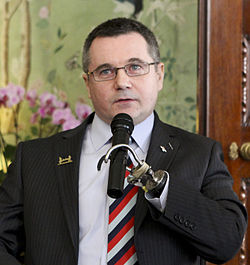Military career
Norton joined the Royal Army Ordnance Corps (which later amalgamated into the Royal Logistic Corps) as a private in 1983. He reached the rank of warrant officer class 1 and was appointed a conductor, the most senior non-commissioned appointment in the British Army, before being commissioned as a captain on 8 July 2002. [2]
George Cross
Norton deployed to Iraq in 2005, where he was second-in-command of the American Combined Explosives Exploitation Cell (CEXC) based in the outskirts of Baghdad. Going to the aid of a United States Army patrol that had been attacked by an improvised explosive device (IED) on 24 July 2005, he was checking for the presence of further devices when a secondary victim-operated IED exploded. He lost his left leg and part of his left arm, and he sustained serious injuries to his other leg and lower back. Despite his injuries, he continued to give instructions to his team, suspecting that further devices might be in the vicinity. He refused to be evacuated until he was certain that all personnel on the ground were aware of the danger. A third device was subsequently located and dealt with the following day.
Norton was awarded the George Cross for his actions. The announcement for the medal was gazetted in a supplement to the London Gazette of 24 March 2006. [3] Since his team contained two special agents of the FBI, Christopher Rigopoulos and Nicholas Boshears, Norton was also awarded the FBI Star on 27 March 2009. [4]
Later service
Norton was promoted to major on 31 July 2008. [5] After a 30-year career, he retired from the army on 1 August 2013 on medical grounds. [6]
This page is based on this
Wikipedia article Text is available under the
CC BY-SA 4.0 license; additional terms may apply.
Images, videos and audio are available under their respective licenses.
